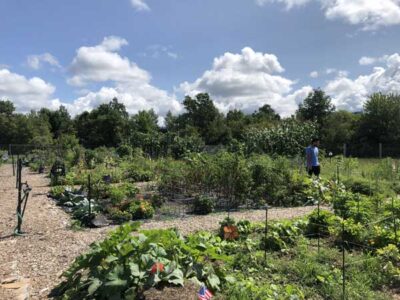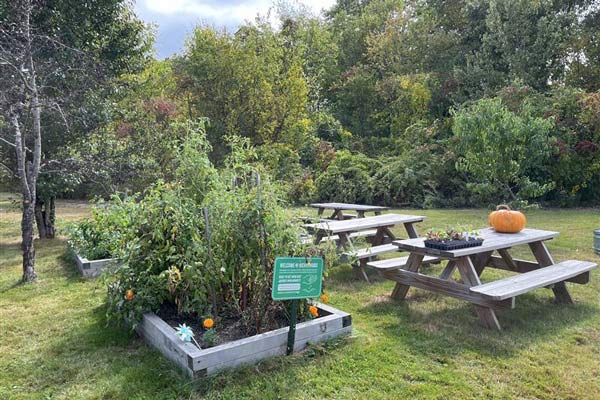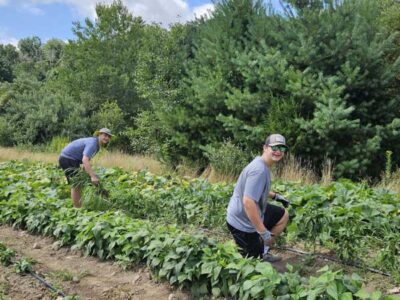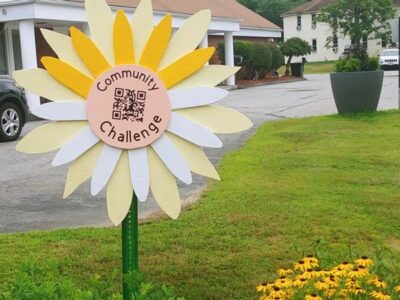Community Greening Awards
The Garden’s Community Greening Awards recognize the work individuals, businesses, municipalities, and community organizations do to create beautiful, sustainable, usable green spaces within their neighborhoods. Each year, multiple awardees receive a one-year membership to New England Botanic Garden at Tower Hill, Certificate of Greening, professional hand pruners, and recognition at our Annual Meeting in June.
Awards will be evaluated on how well they meet these standards. Projects do not need to fulfill all these criteria to be considered, but need to be located in the New England region.
- Enhances the space, as well as the environment
- Exhibits plant diversity
- Shows positive use of native plants
- Promotes food security
- Supports pollinators
- Mitigates urban heat island effects
- Improves stormwater management
- Showcases an innovative design
- Demonstrates sustainable and ecologically beneficial practices such as: reducing water use, avoiding herbicides and pesticides, reducing carbon emissions, keeping existing materials and resources onsite, using natural, reused, and up-cycled materials, and avoiding potentially harmful plants.
All public green space should be planted and maintained in accordance with the city or town’s guidelines where the project is located.
2025 Community Greening Awardees
Berlin Community Garden, Berlin, MA
The Berlin Community Garden has been serving families in and around Berlin, MA, for 12 years. Plots are available free of charge to those in need, and produce is donated weekly to local food pantries, including BC4T, a pantry serving veterans. All gardeners commit to using organic techniques. Participants also come together for a seed and seedling swap at the beginning of the season.

Clark Street Community School Garden, Worcester, MA
Worcester’s Clark Street Community School Garden grew as a passion project for educator Charlene Preston, who, many years ago, began a regular Wednesday gardening club at the school. The gardening club expanded over the years, and students now tend five raised beds, a pumpkin patch, multiple fruit trees, and a native plant pollinator garden. They also maintain beautiful bulbs around the school. Through gardening, students learn how to grow their own food, witness the power of gardens to transform spaces, and experience the joys of getting their hands dirty.

Gardening the Community, Springfield, MA
Gardening the Community, a food justice organization founded 23 years ago in Springfield, MA, addresses hunger in neighborhoods with limited access to fresh produce and empowers youth as leaders in their communities. Youth learn and practice methods of sustainable urban agriculture by gardening in vacant lots in the city. Produce is sold at the organization’s farm store where they accept SNAP and HIP. Through Gardening the Community, youth gain not only gardening skills, but also deeper knowledge of the ways institutionalized racism impacts food access and the power of community in driving social change.

Pine Hill Meadow Garden, Southborough, MA
The Pine Hill Meadow Garden in Southborough, MA, was founded five years ago in response to the growing problem of food insecurity exacerbated by the COVID-19 pandemic. The Pine Hill Meadow Garden collaborates with Rachel’s Table and other nonprofits and food pantries to distribute fresh, healthy food. They pride themselves on growing crops that are culturally relevant to the region’s diverse communities. A sustainable solar panel water pump system used to water crops also ensures that the Pine Hill Meadow Garden is caring for people and planet. This entirely volunteer-run garden has provided more than 5 tons of produce to the community.

The Town of Oxford, Oxford, MA
The Town of Oxford embeds environmental stewardship and sustainability into aspects of municipal work and community life. In 2024, the town’s Pollinator Team led a multifaceted campaign to create pollinator habitat and build awareness about the benefits of native plants. They hosted community events and educational programs, planted pollinator gardens, promoted “low mow” pollinator meadows, and more. In addition to their pollinator-focused work, the town also constructs rain gardens on municipal properties, supports residents with a rain barrel program, and runs campaigns to educate the community about stormwater pollution.


